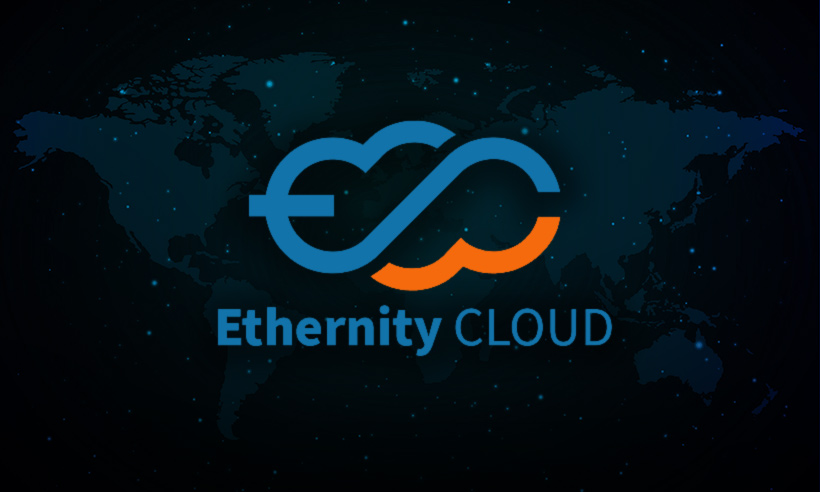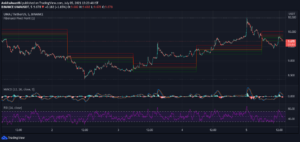
From the time the term Web 2.0 first came into use in 1999 till the recent times where Web 3.0 has slowly but surely crawled into the consciousness of the world, we’ve seen a great migration. We’ve seen the migration of software from the regular desktop servers in homes and businesses to cloud infrastructure. This cloud infrastructure became remote centralized servers that stored the data of users. Because of their centralized nature, these servers have become a primary target for hackers and as a result, we saw over 4.1 billion records lost to data breaches in the first half of 2019 alone and many of these breaches involved cloud computing servers. This is a problem, and the Ethernity CLOUD team have stepped in to solve it. Ethernity CLOUD Founded in 2018 by a team of crypto enthusiasts and technologists, Ethernity CLOUD is a pioneer of decentralized confidential computing on Ethereum compatible blockchain. This product leverages blockchain technology to develop a decentralized ecosystem that allows traditional cloud software to be run as decentralized cloud applications. Ethernity integrates nodes that are located all over the world and self-replicating without user interaction because they follow a set of predefined orders in the Ethereum compatible smart contract. This reiterates Ethernity CLOUD’s mission of having three features which are equally imperative: Anonymity, Encryption and continuous availability. Since the infrastructure of Ethernity CLOUD is built on top of open-source technologies, the use of industry-wide open-source standards to migrate from regular cloud providers to Ethernity CLOUD is quite easy and a simple process. This is a break from the norm where migration to other decentralized hosting solutions has proven very complex. With the Ethernity CLOUD Self-development Kit (SDK), making the transition to the decentralized cloud has become a process that is as secure, transparent and simple as possible. This tool also allows everyone to contribute their ideas and start their solutions. The creation of the Ethernity CLOUD SDK is important because the value of developers’ interaction with Ethernity CLOUD is critical to the rapid adoption and improvement of the platform. Proof of eXecution The Proof of eXecution (PoX) is a method where computational tasks are run in a decentralized way. As tasks are being run, different metadata information is stored on the blockchain, and actual data is then transferred using the InterPlanetary File System (IPFS). By using this method computational tasks are certified on the blockchain while improving the reproducibility of research at the same time. Ethernity CLOUD Architecture The Ethernity CLOUD product is designed to meet the following goals: Decentralized Domain Name System — Ethernity CLOUD supports developers on its platform to implement the decentralized DNS blockchains or public services technologies in their decentralized applications. Performance — Because buyers can rate their service sellers, this ensures service sellers provide the full capacity of the service they advertise. It creates a more competitive market, and buyers enjoy better service overall provided to the buyers. Privacy and Anonymity — The aim of this feature is for service sellers to be able to monitor the usage of their resources but they won’t be able to interfere with the service running on their computers. Continuous Availability — In Ethernity CLOUD there is a design that allows multiple instances of the same node to be in sync and run continuously. This ensures that the buyer’s services are available at all times. What this means is that whenever one instance fails for any reason, all of the other instances will still be up and running. Encryption — Just like with blockchain technology, Ethernity CLOUD uses a trust-less design model where members of the network are considered to be untrustworthy by default. Ethernity’s open-source software code ensures and enforces trust. This reassures the cloud users about their data safety. Token Information ETNY is Ethernity CLOUD’s native utility token. It is an ERC-20 token with a 1billion total supply. The distribution of the ETNY token will be performed on the testnet, right before the mainnet launches. Token Utility Holders of the ETNY token will be able to use it to; Processing fee — Something Ethernity CLOUD develops and provides is a smart contract performing token exchange between data owners (buyers, network users), network operators (sellers, data processors) and dApp developers. The processing fee for this exchange depends on three factors; the service price, the network operator rating and the developer fee. Buy and sell bandwidth Staking — This is how network operators will be incentivized for their availability to process new tasks from data owners. Buy and sell computing resources — Resources like CPU with TEE, Memory etc. Settlements — As tasks are executed, additional fees could apply, and these are based on how the tasks are developed. Fees ranges, especially if the tasks use 3rd party blockchains or tokens, and/or cross-chain bridges for … Continued
The post Ethernity Cloud: The Biggest Decentralized Cloud Computing Service first appeared on Cryptoknowmics-Crypto News and Media Platform.
The post Ethernity Cloud: The Biggest Decentralized Cloud Computing Service appeared first on Cryptoknowmics-Crypto News and Media Platform.
- Coinsmart. Europe’s Best Bitcoin and Crypto Exchange.
- Platoblockchain. Web3 Metaverse Intelligence. Knowledge Amplified. FREE ACCESS.
- CryptoHawk. Altcoin Radar. Free Trial.
- Source: https://www.cryptoknowmics.com/news/ethernity-cloud-the-biggest-decentralized-cloud-computing-service/?utm_source=rss&utm_medium=rss&utm_campaign=ethernity-cloud-the-biggest-decentralized-cloud-computing-service
- "
- 2019
- About
- Additional
- Adoption
- Advertise
- All
- Anonymity
- applications
- architecture
- availability
- available
- become
- being
- Biggest
- Billion
- Block
- blockchain
- blockchain technology
- blockchains
- breaches
- businesses
- buy
- buyers
- Capacity
- centralized
- Certified
- Cloud
- cloud computing
- cloud infrastructure
- code
- complex
- computers
- computing
- Consciousness
- contract
- contribute
- could
- creates
- creation
- critical
- Cross-Chain
- crypto
- dapp
- data
- Data Breaches
- decentralized
- Decentralized Applications
- depends
- Design
- designed
- desktop
- develop
- developed
- Developer
- developers
- different
- Display
- distribution
- dns
- domain
- Domain Name
- ecosystem
- encryption
- ERC-20
- especially
- ethereum
- everyone
- exchange
- execution
- factors
- Feature
- Features
- Fees
- First
- follow
- following
- Founded
- full
- Goals
- great
- hackers
- having
- holders
- hosting
- How
- HTTPS
- implement
- important
- information
- Infrastructure
- interaction
- involved
- IPFS
- IT
- Kit (SDK)
- launches
- leverages
- Making
- Market
- Media
- Members
- Memory
- Mission
- model
- Monitor
- more
- multiple
- Nature
- network
- news
- nodes
- operators
- orders
- Other
- overall
- owners
- performance
- performing
- pioneer
- platform
- possible
- price
- primary
- privacy
- Problem
- process
- processing
- Product
- proof
- provide
- provides
- public
- rating
- records
- regular
- research
- Resources
- Run
- running
- Safety
- sdk
- secure
- sell
- Sellers
- service
- Services
- set
- Simple
- smart
- smart contract
- Software
- Solutions
- SOLVE
- something
- Staking
- standards
- start
- supply
- Supports
- system
- Target
- tasks
- team
- Technologies
- technologists
- Technology
- the world
- time
- token
- Tokens
- tool
- top
- traditional
- transferred
- transition
- transparent
- Trust
- use
- users
- utility
- Utility Token
- value
- web
- What
- while
- without
- world













